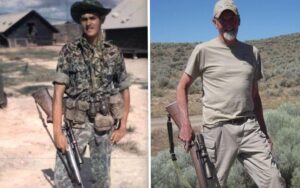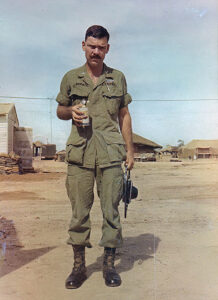HAMILTON GREGORY is a best-selling textbook author and former professor at Asheville-Buncombe Technical Community College. In 1968–69 he served as a U.S. Army intelligence agent in Vietnam, where he recruited and trained Southeast Asians and others for espionage missions inside Cambodia. He lives in Asheville, North Carolina. His latest book is McNamara’s Folly: The Use of Low-IQ Troops in the Vietnam War. Gregory’s article, “McNamara’s Boys,” appears in the Spring 2017 issue of MHQ.

What inspired you to write this book?
I got to know dozens of low-IQ men—“McNamara’s Morons,” as they were cruelly called—while training at Fort Benning, Georgia, in 1967. I was outraged that such men were inducted and sent into combat, with a predictably high rate of death and disability. I vowed that I would someday tell their story—a vow that I fulfilled by writing McNamara’s Folly.
How long have you been working on this book?
I spent four and a half decades—off and on—researching and writing the book.
How did you go about conducting research?
For stories about my interactions with low-IQ men, I relied on my memory and on letters that I wrote to my fiancée (later my wife) while I was in the Army. For information about policies and how they affected the nation, I studied government documents, and I relied on the recollections of veterans whom I interviewed over the years at Veterans Affairs hospitals. I also gleaned anecdotes from veterans’ writings in blogs, articles, and books.
How can readers learn more about the subject and your work?
They can read reviews of my book, such as the one done by West Point’s Modern War Institute (Book Review: McNamara’s Folly) or take a look at some of my other published articles with The Huffington Post and The VVA Veteran (The Men Who Served In Donald Trump’s Stead)(McNamara’s Morons).
What did you edit out of the book? Is there anything you wish you could’ve included but weren’t able to?
At the time I was writing my book, there seemed no real possibility that Donald Trump would win the nomination and then the presidency. If I knew then what I know now, I would not have omitted, in my chapter on draft avoiders, the story of how Trump used a ploy favored by wealthy men to avoid the draft—getting a letter from a family doctor attesting to a physical defect that really should not have been disqualifying.
What’s next for you? Are you working on anything now?
Because there is talk in Washington now about the possibility of a war soon and a military draft for men and women, I am working on articles or a book on “Should We Bring Back the Military Draft?”





